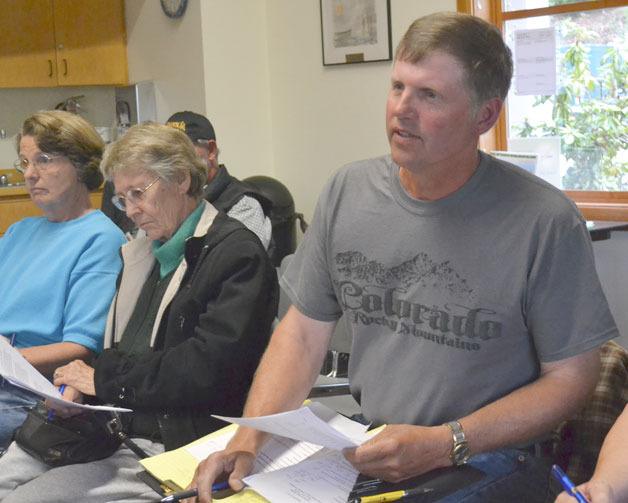The tension was thick at the Diking District 1 Board of Commissioners monthly meeting Aug. 1.
The board presented its findings from its well monitoring report which showed differing ditch and well levels, likely the result of a decrease in rainfall in 2013.
But not everyone agreed.
Former commissioner Ray Gabelein contested the report’s findings. Gabelein argued wetland water specialist Aqua-Terr Systems, Inc., which chose the locations for the monitoring wells, should have written the summary because he thought the report included some opinion.
The study was created as a way for the board to establish the historical baseline for water levels. The board voted to send their findings to the Army Corps of Engineers, which has the primary say in the district’s operation plan.
Commissioner John Shepard presented the well monitoring report, which studied six wells around the district’s main drainage ditch from November 2011 to June 2013.
Two wells were placed in the upland areas, two in the wetland, one in the transition zone and one in the northeast section of the district. The locations were directed by Aqua-Terr Systems, Inc.
The ditch water level increased 6 inches from an average of 2.64 feet in 2012 to 3.15 feet in 2013, but the water levels in the wells unexpectedly decreased an average of 5.13 inches, according to the report.
The discrepancy was due to the increased rainfall from 2012 to 2013, according to the report. Rainfall decreased by 45 percent in 2013. The study showed the rainfall was a more important factor than ditch-water levels in determining the well-water level.
Shepard said he learned a significant lesson from the study. He thought the findings of the ditch-water level would be more important than they turned out to be.
Kraft said not having baseline data was a flaw in their operational plan. All the commissioners relied upon in the past was testimony from former commissioners.
The study will help the board to bring the water level back to a more historic level.
Shepard said he wanted to keep the water levels up to help protect the seasonal wetlands and maintain historical levels. The problem is, historical water levels were never established by the Army Corps of Engineers, and that’s what the study aims to complete.
When the water level in the ditches returns to a more historic level the gravity drains perform better, Kraft said.
“It’s important to recognize that gravity drains remove more water than the pumps ever could and they do so with no additional cost, which saves district money,” Kraft said.
The commissioners voted to accept the report and present their findings to the Army Corps of Engineers.
During the previous meeting in June, the board discussed a settlement with the Citizens in Support of Useless Bay Community and agreed to pay the residents 60 percent of what they paid in taxes for the controversial pump project.
Proponents of the lawsuit say their land assessments were calculated unfairly to pay for the project. The amount was reflected during this meeting’s budget analysis as $40,733.61 against the diking account to the citizens group.
Commissioners Shepard and Kraft were formerly part of that suit, but withdrew their names after joining the board due to conflicts of interest. Shepard could not comment further on the settlement, other than what was previously stated in meetings.
Recently-appointed commissioner Dick Clotfelter was present at the meeting.



